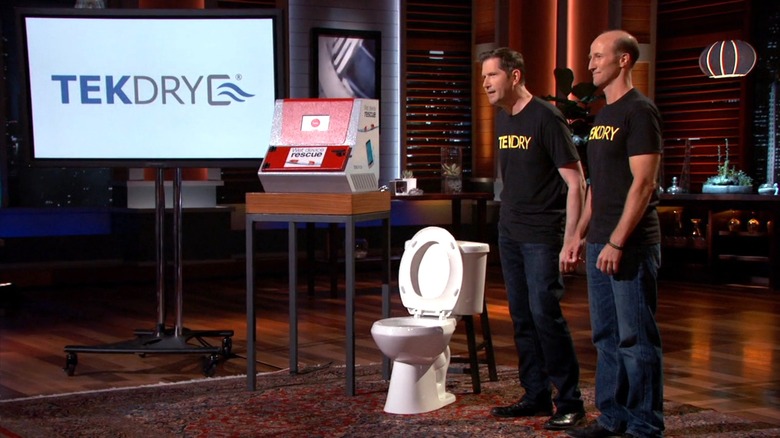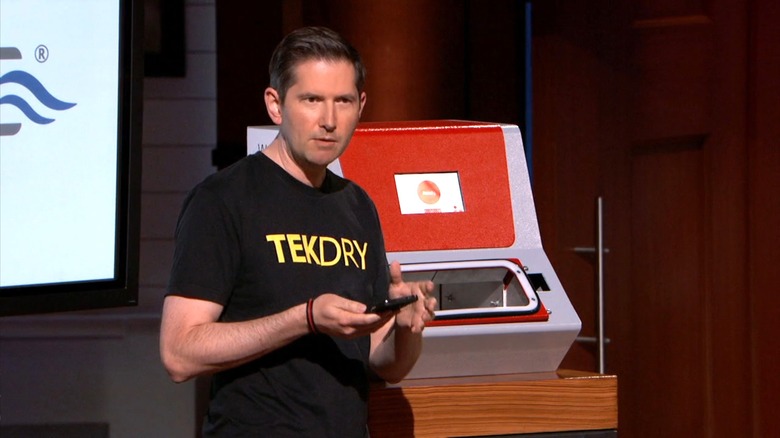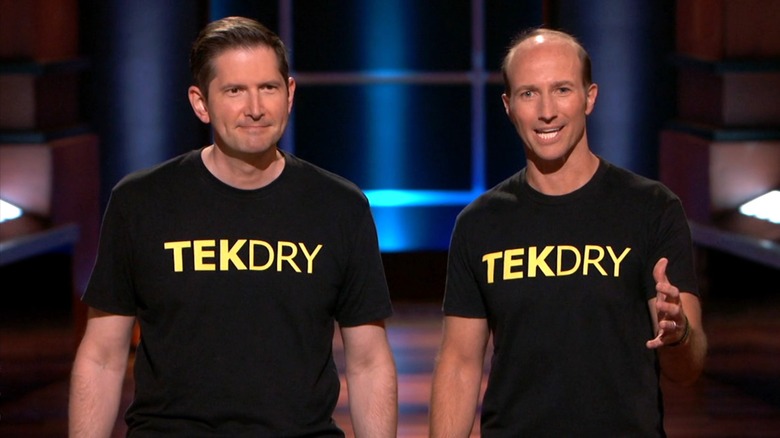What Happened To TekDry From Shark Tank Season 8?
We may receive a commission on purchases made from links.
Water is the mortal enemy of all things electronic. Virtually every one of us has — at one time or another — experienced the unadulterated terror that surges through the body when a cell phone drops in a body of water or a favorite beverage washes across a laptop.
Some might immediately concede the device's fate and bark out (ala Private Hudson, played by Bill Paxton in 1986's "Aliens"), "Game over, man!" Others might rush to plop the water-logged gadget into a bag of rice, hoping the urban myth somehow removes the dampness and fixes the frazzled internal components that fried. That's where TekDry comes in.
In October 2016, Adam Cookson and Craig Beinecke, two entrepreneurs from Denver, Colorado, appeared on "Shark Tank" (season 8, episode 3), hoping to secure $500,000 in exchange for 5% of their company. Their pitch to the Sharks included a few well-timed and well-received puns and a claim that 22 million cell phones are destroyed each year by water.
According to Cookson's LinkedIn page, he had a background in production within manufacturing environments (Toyota and Vestas) before getting involved with TekDry, while Beinecke worked in automated machine manufacturing (with Applied Control).
TekDry's LinkedIn page says it was founded in 2013, but other sources claim it was founded in 2014. Before appearing on the show, the company had already raised $2.2 million in funding and had units operating in 82 stores. After the episode aired, it announced it was expanding to 600 Staples stores nationwide.
What happened to TekDry on Shark Tank?
Much to the shock and horror of the Sharks, Adam Cookson dropped his cell phone into a prop toilet they had on stage. After letting his cell phone soak for a bit, he calmly reached his gloved hand into the commode, retrieved it, and placed it inside their patented "wet device rescue" machine filled with a bevy of special metallic beads.
Cookson then explained to the Sharks that their proprietary process extracts all the air from the internal chamber while heating the beads surrounding the device. In 30 minutes, the total vacuum and the heated beads combined to turn the liquid inside the drenched device into gas that harmlessly evaporates away, leaving a 100% dry, functioning gizmo.
The goal was to hit $650,000 in revenues by the end of 2016. A store rented the box for $80 monthly, with TekDry receiving 60% of the split revenue. For a fee of $39.99, you could dry out a small flash drive or key fob, while medium-sized smartphones and cameras cost $69.99, and bigger items like laptops and game systems cost $99.99. You only paid if the process worked. The company earned $29,000 in sales in 2015, but once it got the 600 units into Staples, it believed it could make as much as $6 million per month with $3.5 million as profit (based on the projected price points).
Barbara Corcoran thought that as cell phones came with better waterproof features and cases, their drying machine would become obsolete sooner rather than later. Lori Greiner recommended offering a mail-in system where customers send in their phones for repair. Kevin O'Leary was the only one intrigued enough to make an offer, but instead of the $500,000 with 5% equity, he countered with a loan (of the $500,000) at 13% interest plus the 5% equity. Cookson and Beinecke took the bait, as it were.
Is TekDry still in business after Shark Tank?
After some 4 million viewers saw the episode, the company's media initiatives increased engagement by 300%, advertising click-through rates jumped to 18.8%, and the value of its media placements was 700% of the cost.
In an interview with Business 2 Community in August 2022, Adam Cookson said that sales had continued to grow, added more sales staff, expanded its team, and was in the process of getting 500 more of its machines into Staples stores. Additionally, they had secured another fundraising round to build its "next batch of equipment."
Despite that optimism, trying to connect to TekDry's website today gives a 404 error message (meaning it no longer exists), its Instagram feed hasn't had a post since 2017, and its X (formerly known as Twitter) account has been suspended. Both Cookson and Beinecke's LinkedIn profiles show they are still part of the company but list other job roles after TekDry.
Odder yet, Staples.com still lists TekDry services on its website, but if you try selecting a state on the map to find the nearest store with its services, it doesn't work. We're not entirely sure exactly what's happening, but dropping your doohikey into rice might really be the only option.
"Shark Tank" is available for purchase on Prime Video.


